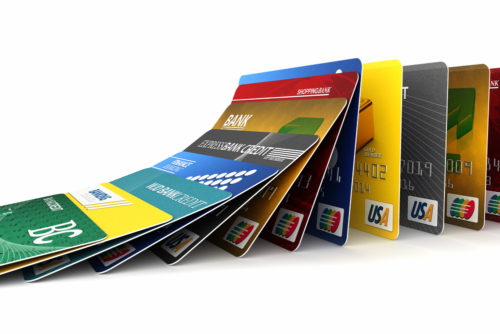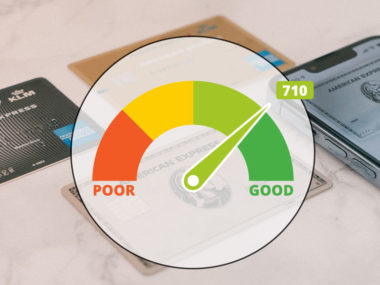Applying for credit cards often requires a hard inquiry on your credit score, which means it can potentially hurt your credit score — at least temporarily. If you’re only applying for one card, your score may only go down a few points. If you apply for multiple cards in a short amount of time, on the other hand, your score could go down dramatically.
However, there are some instances in which applying for a new credit card won’t hurt your credit score, and there are other factors to consider that might make getting a new card worthwhile in any case. Diversifying your credit portfolio requires multiple cards, for example, and building up your score often requires spending with a credit card.
Whether you’re planning to increase your credit utilization, or simply need some extra financial security, here are all the factors to consider before applying for a new credit card and how it will affect your credit score.
Table of Contents
How Hard Inquiries Affect Your Credit Score
There are two types of credit inquiries: soft inquiries (or soft pulls) or hard inquiries (or hard pulls). Both inquiries look at your credit score, but only hard inquiries can impact your score because those pulls are reserved for when you are looking to open a line of credit. Even if you aren’t approved for a line of credit, the hard pull will send a message to the credit bureaus that you are interested in getting a line of credit or loan. Too many inquiries may make it seem like you’re doing some risky borrowing (as you’re trying to open up multiple accounts at one time), which may send a negative signal to the bureaus and any lenders that check your score.
How Much Do Hard Inquiries Lower Your Credit Score?
Your credit score is determined by a multitude of factors. These include:
- Payment history — 35%
- The amount you owe on credit and your total debt (utilization ratio) — 30%
- Ages of your credit accounts — 15%
- New lines of credit and credit inquiries — 10%
- The various types of credit open (car loans, mortgages, credit cards, etc) — 10%
Luckily, hard inquiries only have a small and relatively short-term impact on your overall credit score, but regardless of the small percentage, too many credit inquiries can still cause issues. Overall, a single hard inquiry may drop your score about 5 to 10 points, which shouldn’t make a big impact to your ability to get approved. However, if you have multiple inquiries within a few months to a year, those points can really add up, as each inquiry may cost you an additional 10 points. Over time, this can be enough to drop you from good credit to fair credit.
If you have multiple inquiries from the same bank, lender, or company, then your credit score won’t be affected as much.
How Long Does a Hard Inquiry Stay on Your Credit?
Any inquiries that you make or give a lender your consent to perform will remain on your credit report for up to two years and could affect your score for the following six months after the inquiry. However, if you believe you may be the victim of identity theft or that inquiries were made without your consent, you can dispute those inquiries with the credit bureaus.
Additionally, lenders and the bureaus are understanding of when you need to shop around for loans in order to get the best deal. Although this rule doesn’t apply to credit cards, you can shop around for mortgages, car loans, or other large loans, and any inquiries made within a 14 or 45 day window (depending on the scoring model being used) may be grouped together as a single inquiry in order to have less of an impact on your overall credit score.
Does Having Multiple Credit Cards Hurt Your Credit Score?
Applying for multiple credit cards within a short amount of time (or even within a single year) can cause harm to your credit score. This is because of the amount of hard inquiries that will be performed on your score. However, if you wait a year or more between credit card applications, getting a second or third credit card can actually be quite beneficial.
Whereas hard inquiries can have a negative effect on your score, having higher lines of credit with less credit utilized can help boost your score. That is because getting multiple lines of credit can help decrease your credit utilization ratio. Getting your credit limit increased on existing cards can also have this effect.
For example:
- Your first card had a total line of credit of $5,000. What you currently owe is $3,500. This means you have a utilization ratio of 70% — which can negatively affect your credit score, as the majority of your credit has been used.
- However, if you get approved for a new credit card with a line of credit of $12,000, and you have yet to use that line of credit for any purchases, then your credit utilization will only be $3,500 of a total line of credit of $17,000. Your utilization ratio will drop considerably to about 21%, which is much better for your overall credit score.
The initial application to a new credit card may hurt your score, but expanding your access to credit can lower utilization and help your score in the long run. It’s also important to remember to pay the balances off regularly in order to keep your utilization ratio low.
Applying for Credit Cards Without Hurting Your Credit
If applying for credit cards can hurt your score, but over time improve your score, then when should you apply for a new credit card? When can you apply without hurting your score, and are there other options?
When To Apply for a Credit Card
The best way to get multiple credit cards without doing major damage to your credit score is to be strategic: use and pay off the credit card(s) you already have, and space out and strategically apply for new cards when your credit score has improved. It’s important to remember that your score will (most likely) recover in about six months time as long as you are responsible with your credit. Also, avoid applying for new cards if you also plan on applying for new loans (such as a mortgage or car loan) in the near future.
Hard inquiries will damage your score whether or not you’re actually approved for a credit card, so be sure to be aware of your score beforehand (you can ask for a credit report from the bureaus once a year with no penalty) and what limits you might face in the application process. If your score is still in the “good-to-fair” range, then don’t try to apply for a card that requires a high score.
If you’re having trouble getting approved for a credit card, there are ways to not only get a new credit card but also improve your credit score without causing a hard inquiry.
Soft Inquiry Credit Cards and Pre-Approval
There are some credit card companies and issuers that allow you to get pre-approval that don’t perform a hard pull on your credit score until you apply. When pre-approval happens (for either a new line of credit or a credit limit increase) it often only performs a soft pull on your report. However, once you apply for the card it will perform a hard inquiry, so pre-approval can be helpful for when you want to shop around and compare your options. If you’re simply asking for a credit limit increase, they may not perform a hard pull in order to approve you, but this depends on the bank and issuer.
However, there are some instances of secured credit cards that don’t require a hard inquiry in order to be approved. That’s because these types of cards require you place a deposit down in order to secure the line of credit in case you default on payments. These cards are normally easy to get approval for, as they’re often offered to people with poor credit history in order to help them improve their score.
The Shopping Cart Trick
There is also a nifty trick that can help you get credit cards without causing a hard inquiry to appear on your credit report. This is known as the “shopping cart trick” and is reserved for when you’re online shopping and a store “pre-approves” you for their store-sponsored credit card.
These credit cards normally rely on Synchrony Bank, Wells Fargo, or Comenity Bank, but are only able to be used inside the store that has sponsored the card. Regardless, these cards can help you build up credit without having to worry about the negative impacts a hard inquiry may have on your credit score. Plus, you can sometimes earn special discounts or points in stores that you frequent if you get their card. Be sure to familiarize yourself with the process, and be aware of what steps you need to take in order to trigger the “pre-approval” offer.
Image Source: https://depositphotos.com/





